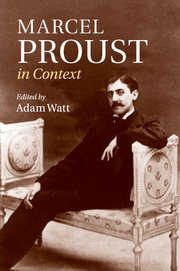Book contents
- Frontmatter
- Contents
- List of Illustrations
- Notes on contributors
- Figure I. Marcel Proust, portrait in oils by Jacques-Émile Blanche, 1892
- Preface
- Figure 2. Proust photographed on his death-bed by Man Ray, 1922
- Note on the text
- Chronology
- Part I Life and works
- Part II Historical and cultural contexts
- Part III Critical reception
- Chapter 24 Critical reception during Proust's lifetime
- Chapter 25 Early critical responses, 1922 to 1950s
- Chapter 26 Mid-twentieth-century views, 1960s to 1980s
- Chapter 27 Late-twentieth- and twenty-first-century responses
- Chapter 28 Modernism
- Chapter 29 Adaptations/afterlives
- Chapter 30 Translations
- Further reading
- Index
- References
Chapter 28 - Modernism
from Part III - Critical reception
Published online by Cambridge University Press: 05 November 2013
- Frontmatter
- Contents
- List of Illustrations
- Notes on contributors
- Figure I. Marcel Proust, portrait in oils by Jacques-Émile Blanche, 1892
- Preface
- Figure 2. Proust photographed on his death-bed by Man Ray, 1922
- Note on the text
- Chronology
- Part I Life and works
- Part II Historical and cultural contexts
- Part III Critical reception
- Chapter 24 Critical reception during Proust's lifetime
- Chapter 25 Early critical responses, 1922 to 1950s
- Chapter 26 Mid-twentieth-century views, 1960s to 1980s
- Chapter 27 Late-twentieth- and twenty-first-century responses
- Chapter 28 Modernism
- Chapter 29 Adaptations/afterlives
- Chapter 30 Translations
- Further reading
- Index
- References
Summary
To read Proust today, some ninety years after his death, is to encounter him enveloped in celebrity, weighed down by reams of critical commentary, domesticated by the wealth of facts and hermeneutical grids with which we can now arm ourselves as we interpret the complexities of his imagined world. Proust has become so well known that it may be difficult for us modern-day readers to imagine just how revolutionary his prose style appeared to the majority of the European reading public during the period ranging from 1913 (when Du côté de chez Swann was first published) to 1927 (when Le Temps retrouvé finally appeared, five years after the author's death). Proust had difficulty getting published, in part because, like Wagner's tetralogy, À la recherche du temps perdu sinned against the accepted order of magnitude for works of art: the sentences were too long, the thoughts too convoluted, the general thematic aims not apparent enough in their wide extension. Put succinctly, what Proust was proposing as a novel was unusual, strange, disquieting. Even the most intelligent of readers found the work hard to classify, impossible to discuss within the given parameters of early-twentieth-century fiction. One such reader, particularly adept at recognizing Proust's genius, was Walter Benjamin, the German-Jewish philosopher and essayist. His description of the Recherche is worth quoting, both for its lapidary incisiveness and for the brilliance of its metaphorical formulation. Here are the first sentences of his essay ‘The Image of Proust’, initially published in 1929:
The thirteen volumes of Marcel Proust's À la recherche du temps perdu are the result of an unconstruable synthesis in which the absorption of a mystic, the art of a prose writer, the verve of a satirist, the erudition of a scholar, and the self-consciousness of a monomaniac have combined in an autobiographical work. It has rightly been said that all great works of literature establish a genre or dissolve one – that they are, in other words, special cases. Among these cases, this is one of the most unfathomable. From its structure, which is at once fiction, autobiography, and commentary, to the syntax of boundless sentences (the Nile of language, which here overflows and fructifies the plains of truth), everything transcends the norm.
- Type
- Chapter
- Information
- Marcel Proust in Context , pp. 214 - 220Publisher: Cambridge University PressPrint publication year: 2013



